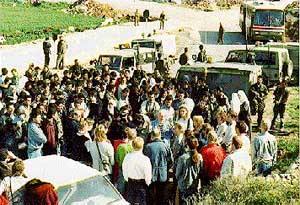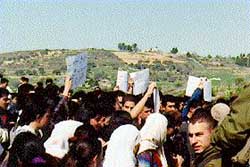Another member of the Public Relations Office at Birzeit University visited me in my house at 8.30am to inform me that there was no way to the university due to a checkpoint between Ramallah and the university. According to news reports, since early in the morning there had been a curfew on Birzeit and other surrounding villages in Area "B" (see the Oslo 2 map entry if this is new terminology for you). The purpose of the curfew was to allow the Israeli Army to conduct arrests in the area. Of whom, we had no idea at this point.
I headed with a colleague to the checkpoint on the way to the university, just on the border of this part of Palestinian autonomous area "A" and Area "B" (joint Israeli-Palestinian security control), in a place called Surda, the same checkpoint site described in the two previous entries relating to closure.
At the checkpoint, a few cars were being turned away by Israeli soldiers. I asked what was happening. A soldier replied that the area on the other side of the checkpoint was a "closed miltary area" and would mostly likely remain so until the evening. We backed up and returned a short distance along the road until noticing a crowd of Birzeit University students arriving, who had walked the two miles from the centre of Ramallah. We got out to watch.

At the same time, a tour bus was coming down the road to the checkpoint. I stopped the bus and asked them to open the door, asking, "You wouldn't be on your way to Birzeit Univerisity, would you?" A Swede named Ulf Kamerson introduced himself, who had arranged to bring a choir from one of the leading music conservatories in Sweden to sing for the students during lunch.
"Somehow I don't think you are going to get there, at least for a while," I said, grinning. This, I told them, was the third time we had been prevented from travelling between the Palestinian towns of Birzeit and Ramallah since the redeployment. The bus eased down towards the checkpoint and everyone climbed off, unpacking cameras and tape-recorders, while students collected in a group before a line of Israeli soldiers and jeeps. The students began arguing with the soldiers about the situation.
Instead of looking at these situations as a negative thing - the group being prevented from travelling to the university - I tend to see them in a positive light. After all, this is how Palestinians experience life. When visitors from outside the country
The Swedes took photographs and interviewed students. After a short time, they came back to me and said, "What shall we do now?"
"You are a choir", I said, "Sing!" And sing they did (above).

The soldiers and students stopped what they were doing and just gaped. They were totally shocked. The sound was beautiful, sweetly filling the air for about ten minutes, while all stood and listened in silence.
After the choir had finished, the students and choir made placards in English, Swedish, Arabic and Hebrew (see right), each asking the question, "So this is peace?".
"So what?" sneered a Reuters photographer standing nearby when I commented on the appropriateness of this.
Students began singing Palestinian songs, including, Biladi ("My country") and a song called "Welcome to the Borders", whose slightly-altered lyrics went:
"They stopped me at the bordersThe demonstration carried on peacefully for an hour, faculty on their way to the university joining the students. Then, it happened...
They asked for my ID
I told them I was Palestinian..."